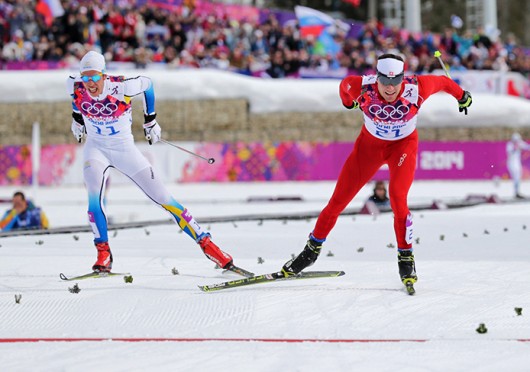
Swiss skier Dario Cologna (right) rushes to the finish during the Cross-Country Men’s Skiathlon Feb. 9 at the 2014 Olympic Games in Sochi, Russia. Cologna won the race with a time of 1:08:15.4.
Courtesy of MCT
The Olympic Games can be seen as the most coveted sports competition for participants. Athletes train their whole lives to be given at shot at competing for a gold medal and go to great lengths to have such an opportunity.
The 1994 U.S Figure Skating Championships in Detroit show a perfect circumstance of how far people are willing to go to get to the gold. Figure skater Tonya Harding’s ex-husband, Jeff Gillooly, and friends admitted to planning and carrying out an attack on her competitor, Nancy Kerrigan, during a practice session before she was set to perform in the U.S. Figure Skating Championships in hopes of keeping her off out of the Olympic competition. Though injured, Kerrigan made a comeback and earned a silver medal in the ladies singles figure skating competition at the 1994 Winter Olympics in Norway.
Although that example of unsportsmanlike conduct has tainted the view of the integrity of athletes, the competitors of the 2014 Sochi Games have restored some faith in the humanity of athletes and their drive to keep sportsmanship a part of the competition.
During the men’s semifinal of the cross-country sprint Feb. 11, Russian skier Anton Gafarov broke his left ski. Justin Wadsworth, who is a three-time U.S Olympian and now the coach of the Canadian cross-country skiing team, saw this happen and ran to aid the skier with a replacement ski. Gafarov finished the course 2:49.62 behind the top place finisher.
Wadsworth told the Associated Press he wanted Gafarov to “have a chance to complete the race with dignity.”
“It is entirely to be applauded,” International Olympic Committee spokesman Mark Adams said during a press conference after it happened. “That’s one of the things why we all love the Olympics, because, as well as being an amazing elite sport, there is something special as well, there are values underlying it as well.”
Another strong example of sportsmanship was shown between the Russian and German cross-country skiers and biathletes. Germany’s grinding machine, used to prepare skis before competing, got damaged on the way to Sochi. Russia allowed Germany access to its machine before the race.
But it is perhaps the Olympic spirit reported by USA TODAY about Dario Cologna of Switzerland that is the most inspiring.
Cologna won the gold in the Cross County Men’s Classic in 38:29.7. Cologna waited 28 minutes for the last place finisher, Roberto Carcelen of Peru, to cross the finish line. Carcelen broke a rib shortly before the games but wanted to still compete because he was one of three athletes that qualified from Peru. It is a standard procedure that skiers usually wait to congratulate all the finishers, but to wait nearly 30 minutes is unheard of. Cologna warmed the hearts of the crowd with his thoughtfulness.
Almost every athlete entered Sochi with one goal in mind: win a gold medal. But not every athlete entered the winter games with sportsmanship as a top priority. It is encouraging to see these athletes in the midst of intense competition remember the true identity of sports and the values they were founded on. In Sochi, Russia, sportsmanship is very much alive.


